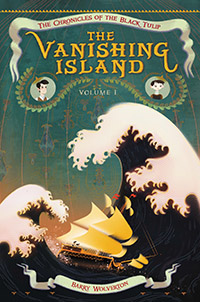“Changing your fate in life wasn’t something to be undertaken lightly,” writes Memphis novelist Barry Wolverton in his new middle-grade fantasy, The Vanishing Island. “Weak men need not apply.”
 It’s sixteenth-century Britannia, and Bren Owen has a wanderer’s heart but the luck of a black cat. When he again happens to be in the wrong place at the wrong time, the resulting explosion (yes!) lands him an “apprenticeship” in Rand McNalley’s mapmaking empire. But it’s not quite the quiet, steady work of recreating prize maps—no, Bren is assigned vomitorium duty. McNalley’s raucous Explorers’ Feasts require a recovery room, with Bren serving as a sitter to the drunks. If he does a good job, he’s ensured the opportunity to move into map-drafting.
It’s sixteenth-century Britannia, and Bren Owen has a wanderer’s heart but the luck of a black cat. When he again happens to be in the wrong place at the wrong time, the resulting explosion (yes!) lands him an “apprenticeship” in Rand McNalley’s mapmaking empire. But it’s not quite the quiet, steady work of recreating prize maps—no, Bren is assigned vomitorium duty. McNalley’s raucous Explorers’ Feasts require a recovery room, with Bren serving as a sitter to the drunks. If he does a good job, he’s ensured the opportunity to move into map-drafting.
Bren is dissatisfied with this station, and even more so with the adults around him who think he should be thankful for the work. Others feel he should be grateful for the opportunity to live in the small town called Map, to be surrounded by maps, but Bren? Bren would rather be the one discovering the things that maps are made of. “Pirates could be famous,” Bren thinks to himself. “Why not delinquents?”
When a tall, sleek ship takes port in Map, things begin to happen. A mysterious coin is given to Bren under dubious circumstances. It’s a paiza, a trinket filled with history and secrets, and Bren realizes it might be the very thing he needs to propel himself out of Map.
The Vanishing Island is a story of big dreams and of breaking away. It is a story of seeking riches, and the way deeply hidden treasure is somehow more valuable than easily obtained wealth. Treasure shrouded in mystery and requiring both brains and brawn to uncover is by far the most attractive, and this sentiment rings true for Bren and Admiral Bowman of the Albatross, the ship Bren finally manages to board.
 But journeys like these are rarely glamorous, and the realities of an ocean voyage—the danger, the boredom, the rudimentary navigation, the crew politics—make this story one of both great historical detail and the lunacy of adventure. “[B]eing true to your word and being truthful weren’t always the same thing,” Bren thinks on this journey, and that one statement beautifully summarizes both this voyage and the characters in this story.
But journeys like these are rarely glamorous, and the realities of an ocean voyage—the danger, the boredom, the rudimentary navigation, the crew politics—make this story one of both great historical detail and the lunacy of adventure. “[B]eing true to your word and being truthful weren’t always the same thing,” Bren thinks on this journey, and that one statement beautifully summarizes both this voyage and the characters in this story.
The Vanishing Island is also, at points, a fascinating look at the cost of information. “Exploration requires investors,” says McNalley to Bren after one particularly degrading shift in the vomitorium. This facet of the story could lead to some great discussions on where we retrieve our information, how reliable are our sources, and the cost versus the inherent value of knowledge. It’s a look at the true birth of the Information Age, when data from abroad began to outweigh dirt under fingernails. “All of us who use maps put ourselves at the mercy of the maker,” McNally says to Bren.
Bren is a clever boy, and you’ll find yourself rooting for him even through his worst decisions—“How many different folks are you in trouble with, boy?” someone wonders. He’s witty and curious and chock full of wanderlust, the type of character a reader is thrilled to get to know. Children who enjoyed the adventure of The Map to Everywhere by Carrie Ryan and John Parke Davis, or the mystery in The Westing Game by Ellen Raskin, should give The Vanishing Island—the first in a new series called The Chronicles of the Black Tulip—a try. Full of maps and mystery and mayhem, secret societies and stealing and ships, it’s a romping adventure of a tale, certain to charm both middle-grade readers and their mentors.

Kristin O’Donnell Tubb is the author of The 13th Sign, Selling Hope, and (coming soon) John Lincoln Clem: Civil War Drummer Boy. She lives in Williamson County.
Tagged: Children & YA





